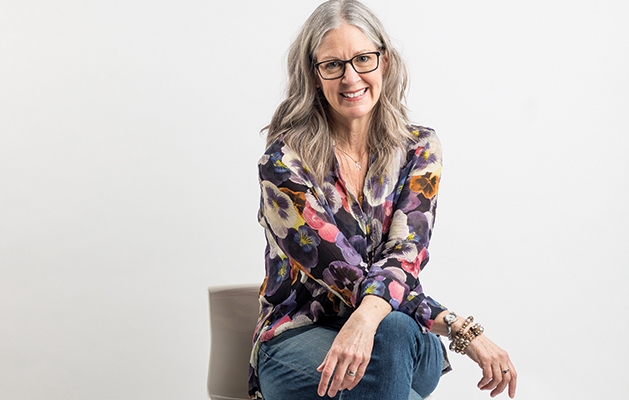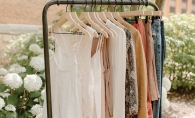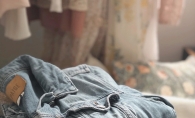
“Most people in the United States only wear about 20 percent of their wardrobes. That means that 80 percent of the clothes are languishing in their closet being unworn,” Nancy Dilts, a personal wardrobe stylist, says. “That’s an enormous amount of waste.” Dilts specializes in helping people become more sustainable in their shopping habits.
The United States Environmental Protection Agency estimates that, in 2018, there was 11.3 million tons of textiles sent to landfill from the U.S. alone. Not only are perfectly good clothes gathering dust in closets, but we’re also filling miles of landfills with materials that, in many cases, could have gotten more use.
Though fashion waste and mass-produced clothing sold at a lesser cost, known as “fast fashion,” is a worldwide issue, consumers and companies are beginning to learn how to create eco-friendlier practices.
Starting With What You Have
“The piece that’s most important is that people are actually wearing what they own,” Dilts says. When working with a new client, she often begins with a closet consultation, a great starting place for creating a more sustainable wardrobe. She suggests creating a foundation for a great closet from the quality pieces that people already have. “[People] will ultimately be buying less by making the clothes they already own work better for them,” she says.
Once a shopper makes use of what is already in their wardrobe, Dilts suggests that people “purge, donate what can be donated and consign what can be consigned.” Instead of hanging onto items that are outdated or do not fit correctly, give those pieces a second life. Consider collaborating with local consignment stores, selling online or donating to thrift shops rather than throwing garments away.
Shopping Second-hand
With a pared down closet, Dilts gives a bit of advice as clients head back into the shopping world: start second-hand. “Second-hand shopping is what I’m an advocate of because you’re keeping quality pieces in the use stream,” says Dilts.
Not only does shopping at thrift and consignment stores extend the life of clothing pieces, Dilts says it can also be better for wallets in the long run. “You can afford to invest in those higher-quality pieces that you may not be able to afford in traditional retail. And they last longer than if you buy fast fashion or a lower-quality piece brand new,” she says.
Shopping at thrift stores is a hunt, but it’s also a great way to find hidden treasures. While it can be a challenge, Dilts has some tips for making the experience successful: Be patient, be persistent and know your style.
“You’re looking for the diamonds in the rough [while thrifting],” Dilts says. “Don’t settle for a great deal. Even if it is a great deal, if it isn’t right, if it doesn’t fit you well, if it’s damaged, don’t settle. If it’s not right for you, you have to learn to let it go.”
Dilts most often visits consignment stores when shopping with clients because they offer a more curated selection, so it can be easier to find styles that are high quality and fashionable. At many consignment stores, shoppers can snag gently worn name-brands at a more convenient price.
Many also appreciate the high level of sustainability that a consignment shop provides. “Consignment is a closed loop,” Dilts says. “The consignor is a local person, the shop owner is a local retailer, the person buying it is local and [clothing is] being reused.” While thrift stores often see mass donations and end up sending textiles to landfill, consignment shops “extend the life of a garment in a more reliable way,” Dilts says.
Here are a few of Dilts’ go-to consignment shops in the Twin Cities:
• Elite Repeat carries both new and consigned women’s clothing, accessories, home goods and art in St. Paul. 1336 Randolph Ave., St. Paul; 651.699.2315; eliterepeatstpaul.com
• Turnstyle is a national consignment company with a location right here in Woodbury. They carry home furnishings, accessories and clothing for men, women and children. 9470 Hudson Road; 651.578.6684; turnstyleconsign.com
• Clothes Mentor has locations across the country, including one in Woodbury and several more surrounding the Twin Cities. They carry consigned women’s clothing, shoes and accessories. 10150 Hudson Road Suite 152; 651.714.4488; clothesmentor.com
• Fashion Avenue has locations in Edina and Wayzata, and offers couture, designer and contemporary clothing and accessories for men and women. Edina: 4936 France Ave. S.; 952.929.7919; Wayzata: 810 Lake Street E. Suite 2; 952.224.7014;
fashionavenueresale.com
Shopping New and Ethically
“If we don’t have success [at consignment stores], I really encourage people to shop ethically as best they can if they do buy new,” Dilts says.
Shopping ethically often means understanding where garments come from, how they are made and how long they will last. Look for companies that utilize recycled materials, focus on timeless styles or have a dedication to responsible factory and employment practices.
And opting out of fast fashion for an eco-friendlier wardrobe doesn’t have to mean sacrificing style or sticking to just the basics. Though it can be tempting to grab the newest trends from the closest chain store, there are other ways to show personal style without sacrificing sustainability.
“Invest in high-quality, enduring, classic pieces,” Dilts says. “For those trends, focus on them being accessories and things that are more interchangeable.” She also recommends looking for trends that will stay relevant for longer. “If you’re not going to wear it 30 times, don’t buy it.”
If you can’t find the pieces you’re looking for at thrift or second-hand stores, consider opting for local boutiques and designers that value sustainability and ethical practices to add a bit of personality to your wardrobe.
The Twin Cities is home to many fashion-forward boutiques that support ethical designers. Here are a few of Dilts’ favorites:
• Spoils of Wear is a family owned, sustainable boutique in St. Paul that focuses on fair trade, zero waste and pieces made in the U.S. They carry women’s and men’s clothing, accessories and gifts. 1566 Selby Ave., St. Paul; 651.414.9698; spoilsofwear.com
• Niche carries women’s styles from many Minnesota-based female artists. They are located in St. Paul and are committed to ethical manufacturing processes. 2506 University Ave. W., St. Paul; nichemn.com
• Atelier 957 brings fashion-forward women’s styles to St. Paul while focusing on ethical practices, handmade pieces and small designers. 957 Grand Ave., St. Paul; 651.646.0111; atelier957.com

Capsule-ize your Wardrobe
A capsule wardrobe is one way that people look to solve the problem of unused clothing. It restructures one’s closet to minimize the amount of clothes owned and maximize the frequency of using each piece. It involves having a set number of items in your closet and knowing how to style them in various ways so you will wear the pieces more often. Many who are interested in capsule wardrobes will use a stylist or follow a guide, like Courtney Carver’s Project 333, which suggests 33 items for every three-month season.
While capsule wardrobes aren’t always practical for everyone, they can be used as a way to ease styling for certain occasions.
“Oftentimes, it’s for a specific something, so it’s creating a capsule wardrobe for traveling or a work capsule wardrobe, so it makes daily dressing easier,” Dilts says. “Some people are really wanting to embrace minimalism, so it’s helping them to figure out what pieces they already own work really well and then building out from there.”









